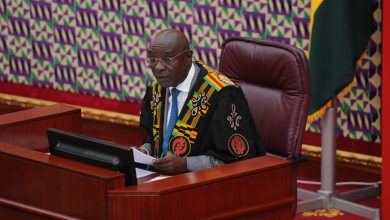MP for Ahanta West proposes key measures to tackle sanitation situations in Ghana

The Member of Parliament for the Ahanta West Constituency, Mavis Kukua Bissue Boateng, has outlined measures to reduce sanitation challenges facing the country.
Speaking on the floor of Parliament, Madam Bissue Boateng mentioned how sanitation issues are impacting not only our health but also tarnishing the country’s image on the international level and hindering the growth of tourism, especially in the Western region, specifically her constituency.
She noted that given the Water and Sanitation Ministry’s budgetary allocation on sanitation, the situation has not witnessed any significant improvement.
Mavis Mavis Bissue Boateng indicated that a proliferation of slums, homelessness, non-enforcement and compliance of laws are major contributors to the sanitation issues.
” Sanitation issues do not only impact negatively on our health and general well-being as people, but they also tarnish our image internationally, hinder the growth of tourism in my constituency, as well as stifle the economic potential of our Hunter West. Mr Speaker, I know that the Ministry of Sanitation and Water Resources has had some budgetary allocations over the years towards addressing the nation’s sanitation challenges,”
From the Ministry of Finance budget statement 2020 – 2023, the ministry was allocated 360,000,000 Ghana cities in 2020, 362 million Ghana cedis in 2021, 360 million Ghana cedis in 2022, and 374,000,000 Ghana cedis in 2023, indicating a steady increase of funding. Notwithstanding, our sanitation does not appear to be improving, highlighting the need for more targeted and effective utilization of resources to achieve meaningful outcomes. To effectively address these interconnected challenges, I propose the following measures: a national dialogue on rural-urban migration and economic empowerment.
There should be such government-led national dialogue once a year involving all stakeholders, deliberate housing and urbanization strategy for rural communities, and a national drive on proper waste segregation and disposal”
As part of the measures, Madam Bissue Boateng said, a sustainable roadblock, coupled with campaigns on proper waste segregation and disposal, could be a game changer for waste management.
Again, a public-private partnership should not be overlooked in tackling sanitation issues, adding that Assemblies should enforce existing sanitation laws and regulations and be ready to crack the whip on offenders.
” There must be a sustained roadblock. Educational and enforcement campaign on proper waste segregation and disposal. This will immediately give a boost to and expand the waste recycling and collection industry, thereby creating job opportunities for our teeming unemployed youth and keeping our environment clean and healthy,”
The legislator said, “Public-private partnerships collaborate with the private sector to mobilize resources and expertise for large-scale sanitation infrastructure projects, ensuring efficiency and sustainability, and strengthening enforcement of sanitation laws. District assemblies and all relevant agencies must strictly enforce the existing sanitation laws and regulations and apply appropriate sanctions and penalties in the event of any violations.”
“Youth employment in sanitation services Encourage the youth to consider the business of opportunities inherent in the various branches of the sanitation management industry. Seven, provision of labelled litter bins at designated areas and public spaces. This should serve as a clear signal for a new era where indiscriminate waste disposal shall not be countenanced.”
“In conclusion, addressing the sanitation challenge as occasioned by improper waste disposal practices, homelessness, slum proliferation, etcetera demands a coordinated and sustained effort by duty bearers and the public alike with education,” She noted.




![Photo of You cannot blame UG VC for receiving fake award [Article]](https://beachfmonline.com/wp-content/uploads/2020/09/20200904_201418-390x220.png)
